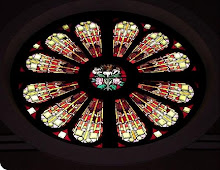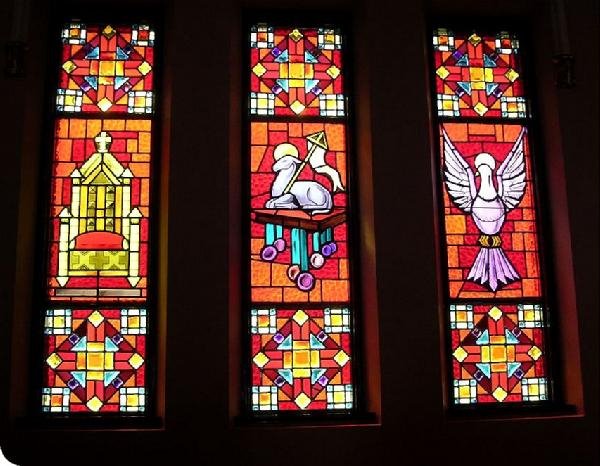Here is an interesting admission from Cardinal Kasper in
L'Osservatore Romano which relates how Brother Roger never converted to the Catholic faith, despite publicly receiving communion on many occasions and being a main player at many World Youth Days and other Catholic-sponsored events and organizations.
"In a talk he gave in the presence of Pope John Paul II in Saint Peter’s Basilica during the young adult European meeting in Rome in 1980, the prior of Taizé described his own personal journey and his Christian identity with these words: "I have found my own Christian identity by reconciling within myself the faith of my origins with the Mystery of the Catholic faith, without breaking fellowship with anyone." In fact, Brother Roger never wanted to break "with anyone," for reasons which were essentially linked to his own desire for unity and to the ecumenical vocation of the Taizé Community. For that reason, he preferred not to use certain expressions like "conversion" or "formal" membership to describe his communion with the Catholic Church. In his conscience, he had entered into the mystery of the Catholic faith like someone who grows into it, without having to "abandon" or "break" with what he had received and lived beforehand. The meaning of some theological or canonical terms could be discussed endlessly. Out of respect for the faith-journey of Brother Roger, however, it would be preferable not to apply to him categories which he himself considered inappropriate for his experience and which, moreover, the Catholic Church never wanted to impose upon him. Here too, the words of Brother Roger himself should suffice for us".
First, let me say that I have nothing personal against Brother Roger (God rest his soul). As a man, he was beyond reproach in word and deed, a true saintly figure. His face literally glowed with peace. Let it also be known that I spent many months living at the Taize Community in France as a young man, first briefly when I was 17, and then for a more extended period when I was 20-21. I even had the wonderful experience of being invited by Brother Roger into the refrectory for birthday cake on my 21st Birthday, a memory I will always treasure. However, one nagging aspect of his life which had puzzled me then, and more so now, was the atmoshpere of casual ambiguity which surrounded his beliefs and religious"affiliation". This seemed to be a breach of conscience and witness for such a spiritual man, or at the least a manifestation of intellectual dishonesty perhaps?
In an age of institutionalized ecumenism, when Catholic Bishops were basically crafting a whole new religion centred around this all-encompassing concept, Brother Roger was touted as the
piece de resistance of what ecumenism was all about. He was the Uncle Sam father figure, recruiting youth for a life of genuine Catholic-Protestant communion. Brother Roger, more than anyone else, incarnated this new view of Christian life. A communion consisting of religion without creeds, life with Christ without conversion--in the traditional sense of the word, and better still a workable example of a philosophy which implicitly promoted denominational relativism. It is truly puzzling, from a Traditional perspective though, how such a saintly man, could attempt to enter into the "mystery" of the Catholic Faith, while rejecting the mystery of the Church herself?
This had many ramifications for me. For one, the Community had a policy that a guest like me was not to inquire into the religious beliefs of his spiritual director. I later found out that my spiritual director was an Anglican (which partly explained the s****y advice he kept giving me). Yet on a deeper level, it was a concrete example of ecumenical insanity at its worst. A "Don't Ask, Don't Tell" approach to many of the most fundemental, and non-negotiable aspects of a genuine Catholic spirituality. All this despite the presence of many Catholic priests and brothers. For a "youth outreach" this left little room for real spiritual growth.
The liturgies were also problematic. I would regard them now as being illicit, since protestant and Catholic both received Catholic communion together en masse. On top of this, the liturgies, despite the nice chants, were really quite banal.
Many people don't realize that Taize had a massive impact on creation of the New Mass. Max Thuringer, a community brother, was in fact one of the infamous "group of 6" protestant advisors that Archbiship Bugnini had invited to give input into the Vatican II liturgy.
Like Taize itself, the New Mass reflects quite well, the new approach by diluting the historically Catholic elements of Divine Worship for the sake of maintaining a superficial level of unity (chiefly among lax Catholics, but also with protestant Christians). Indeed, Brother Roger is a major spiritual father of the New Mass and the new philosophy of Ecumenism, but I am thankful for the opportunity I had to live there and the unique perspective it afforded me.
My Taize experience typified, on a personal level for me anyway, the general collapse of philosphy and spirituality in the "modern" Church. At the time, I thought that it was the most Catholic "experience" one could find. Looking back, this attitude only revealed the depth of spiritual impoverishment experienced by "children of the Council" like myself. On the bright side, I had to go to this protestant community to have my first taste of Latin in the Mass, so it ended up being the first spark that set me on the path to Tradition and my spiritual metamorphosis into a full-blown Trad.
So Our Lord does have a sense of humour in Providence afterall!
The full interview and some good commentary by Sandro Magister can be found at:
http://rorate-caeli.blogspot.com/



